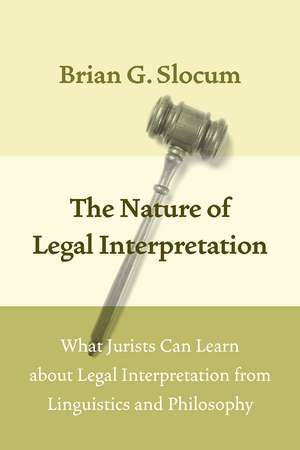The Nature of Legal Interpretation: What Jurists Can Learn about Legal Interpretation from Linguistics and Philosophy
Editat de Brian G. Slocumen Limba Engleză Hardback – 29 iun 2017
Language shapes and reflects how we think about the world. It engages and intrigues us. Our everyday use of language is quite effortless—we are all experts on our native tongues. Despite this, issues of language and meaning have long flummoxed the judges on whom we depend for the interpretation of our most fundamental legal texts. Should a judge feel confident in defining common words in the texts without the aid of a linguist? How is the meaning communicated by the text determined? Should the communicative meaning of texts be decisive, or at least influential?
To fully engage and probe these questions of interpretation, this volume draws upon a variety of experts from several fields, who collectively examine the interpretation of legal texts. In The Nature of Legal Interpretation, the contributors argue that the meaning of language is crucial to the interpretation of legal texts, such as statutes, constitutions, and contracts. Accordingly, expert analysis of language from linguists, philosophers, and legal scholars should influence how courts interpret legal texts. Offering insightful new interdisciplinary perspectives on originalism and legal interpretation, these essays put forth a significant and provocative discussion of how best to characterize the nature of language in legal texts.
To fully engage and probe these questions of interpretation, this volume draws upon a variety of experts from several fields, who collectively examine the interpretation of legal texts. In The Nature of Legal Interpretation, the contributors argue that the meaning of language is crucial to the interpretation of legal texts, such as statutes, constitutions, and contracts. Accordingly, expert analysis of language from linguists, philosophers, and legal scholars should influence how courts interpret legal texts. Offering insightful new interdisciplinary perspectives on originalism and legal interpretation, these essays put forth a significant and provocative discussion of how best to characterize the nature of language in legal texts.
Preț: 294.86 lei
Preț vechi: 367.07 lei
-20% Nou
Puncte Express: 442
Preț estimativ în valută:
56.43€ • 58.55$ • 47.16£
56.43€ • 58.55$ • 47.16£
Carte indisponibilă temporar
Doresc să fiu notificat când acest titlu va fi disponibil:
Se trimite...
Preluare comenzi: 021 569.72.76
Specificații
ISBN-13: 9780226445021
ISBN-10: 022644502X
Pagini: 288
Dimensiuni: 152 x 229 x 25 mm
Greutate: 0.54 kg
Ediția:1
Editura: University of Chicago Press
Colecția University of Chicago Press
ISBN-10: 022644502X
Pagini: 288
Dimensiuni: 152 x 229 x 25 mm
Greutate: 0.54 kg
Ediția:1
Editura: University of Chicago Press
Colecția University of Chicago Press
Notă biografică
Brian G. Slocum is a professor of law at the University of the Pacific, McGeorge School of Law in Sacramento, California.
Cuprins
Introduction
Brian G. Slocum
Chapter 1. The Contribution of Linguistics to Legal InterpretationBrian G. Slocum
Chapter 2. Philosophy of Language, Linguistics, and Possible Lessons about OriginalismKent Greenawalt
Chapter 3. Linguistic Knowledge and Legal Interpretation: What Goes Right, What Goes WrongLawrence M. Solan
Chapter 4. The Continued Relevance of Philosophical Hermeneutics in Legal ThoughtFrank S. Ravitch
Chapter 5. The Strange Fate of Holmes’s Normal Speaker of EnglishKaren Petroski
Chapter 6. Originalism, Hermeneutics, and the Fixation ThesisLawrence B. Solum
Chapter 7. Getting Over the Originalist FixationFrancis J. Mootz III
Chapter 8. Legal Speech and the Elements of AdjudicationNicholas Allott and Benjamin Shaer
Chapter 9. Deferentialism, Living Originalism, and the ConstitutionScott Soames
Chapter 10. Deferentialism and AdjudicationGideon Rosen
Response to Chapter Ten: Comments on RosenScott Soames
Contributors
Index
Index
Recenzii
"Slocum's book is a useful addition to the literature on interpretation. His knowledge of linguistics provides the reader with a comprehensive account of meaning and conventionality in a neighboring field of study."
“This volume of essays considers the question of whether insights from linguistics, philosophy, and psychology could contribute to better methodologies for determining the meaning of legal texts, and goes on to ask the even more provocative normative question, namely, if law should ground the search for meaning in legal texts in what we know from those other disciplines about the relationship of texts and meaning. At a time when legal scholarship on textual interpretation has become increasingly stale, sterile, and formulaic, this collection of interdisciplinarily grounded essays from leading scholars is indeed a breath of fresh air.”
“The Nature of Legal Interpretation is an excellent anthology—well conceived and well executed. The contributors are first-rate, and their contributions reflect that. The theoretical basis of legal interpretation is experiencing a boom period in academic interest and controversy right now. The proper approach to interpreting the Constitution and statutes is of incredible importance, and its importance is being relearned in the wake of Supreme Court opinions interpreting the Second Amendment, the Affordable Care Act, and the due process clause. Although there has been a lot written on the topic in the last decade, most of it has been the product of legally trained academics with little sophistication in linguistic philosophy. The Nature of Legal Interpretation fills that gap and provides much-needed clarity and complexity to how we understand contemporary legal disputes.”
"Certainly, any lawyer who writes or explains the law and who is able to find a few moments for the consideration of matters outside the purely pragmatic considerations of the daily workload will find this a fascinatingly alternative perspective on how language is perceived and valued by those whose interests in the philosophy and structure of communication can help us to understand more about the internal structure of what we are, generally subliminally, doing every day."
